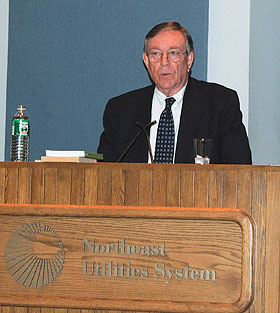  |
| HOME | THIS ISSUE | CALENDAR | GRANTS | BACK ISSUES | < BACK | NEXT > |
Companies will prosper by 'going green,' says conference keynote by Carolyn Pennington - February 19, 2008 | ||||
| Ray Anderson often refers to himself as a “recovering plunderer.” Anderson is the founder of Interface Inc., one of the most profitable carpet manufacturing companies in the world. But his Herculean efforts to make his company 100 percent sustainable by the year 2020 are what is winning him accolades. Anderson was the keynote speaker at last week’s conference on Alternative Products and Green Chemistry sponsored by the Health Center’s Occupational and Environmental Health Center. The conference attracted more than 150 business owners, state and local health officials, academics, and environmentalists from all over the region. Anderson helped set the tone for the conference – a conference focused on identifying the tools and resources business leaders need to compete in a greener marketplace and comply with new international chemical policies. For the first 21 years of Interface’s existence, Anderson never gave a thought to what his company – a petroleum-intensive industry – took from or did to the Earth, except to be sure they obeyed all laws and regulations. Then in August 1994, he had a “spear in the chest” epiphany after reading Paul Hawken’s The Ecology of Commerce. It spurred him to develop “Mission Zero,” the company’s goal of eliminating any negative impact on the environment by the year 2020, through pioneering new technologies, redesigning products, and reducing waste, while increasing renewable materials and sources of energy. “My competitors said it was impossible, and called me a dreamer. Now they are scrambling to catch up,” says Anderson. “The status quo is an opiate, a powerful opiate. Abandoning the comfort of the status quo can produce unimagined results, but it does not come naturally – only through extraordinary commitment.” Anderson’s commitment has paid off in two ways – in higher company profits and lower environmental impact. Interface’s sales have increased by 60 percent, and now top $1 billion. At the same time, his factories use 55 percent less energy derived from fossil fuels, and six of 11 factories run completely on renewable electricity. Scrap to the landfill is down 70 percent; and the factories now use 79 percent less water, largely by abandoning wet printing.
The company is half way there, and right on schedule to meet its “Mission Zero” goals, Anderson said. For business leaders who want to follow in Anderson’s footsteps, he recommended changing linear practices into cyclical ones. “That’s nature’s way,” he said. “In nature, there is no waste; one organism’s waste is another’s food.” For manufacturing companies that means taking technical “food” – petro-chemical, man-made raw materials – and recycling them into the product’s next life cycle. So a carpet manufacturer would harvest yesteryear’s carpets, recycle old petro-chemicals into new materials, and convert sunlight into energy. There would be zero scrap going into landfills, and zero emissions into the biosphere. “Literally, companies will grow by cleaning up the world, not by polluting or degrading it,” Anderson said. “They’ll be doing well by doing good.” Anderson didn’t address only the business community in his talk. He challenged the academics in the audience to become part of the solution. He encouraged them to teach new ways of thinking, and train students to become “agents of change, rather than caretakers of the system of destruction.” He also discussed government’s potential role in a greener marketplace. Anderson believes government’s greatest power is not its regulatory power, but its taxation power. “We should begin to shift taxes away from good things like your income and mine – things you want to encourage – to bad things, like waste and pollution, things you’d really like to discourage and tax right out of existence.” He said that has already begun to happen in Europe: “If enlightened politicians in this country would just follow, we could truly begin to change the world.” |
| ADVANCE HOME UCONN HOME |

